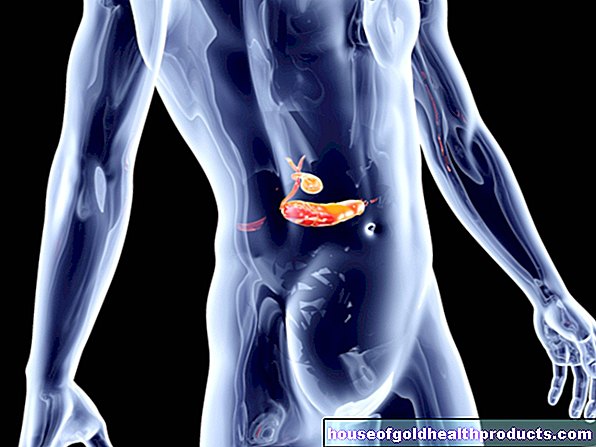Sulpiride
All content is checked by medical journalists.Sulpiride is a nerve-suppressing agent (neuroleptic) from the group of benzamides. It is prescribed for schizophrenia and dizziness. Compared to other classic neuroleptics, sulpiride has a rare side effect of movement disorders (extrapyramidal motor symptoms). Read more about the use, effects and side effects of sulpiride here.
This is how sulpiride works
Psychoses like schizophrenia have several causes. A trigger in numerous mental illnesses seems to be an imbalance of the messenger substances (neurotransmitters) in the brain. This primarily refers to changes in the dopamine, noradrenaline and serotonin distributions. Such messenger substances serve to transmit signals between nerve cells and are involved in moods such as excitement or listlessness.
Sulpiride blocks docking sites (receptors) of the neurotransmitter dopamine on the nerve cells, the so-called dopamine-2 receptors. In low doses, sulpiride helps against depression, dizziness and nausea (antidepressant, antivertiginous and antiemetic effect). In higher doses, sulpiride has an antipsychotic (neuroleptic) effect and can thus help with schizophrenia.
The fact that the active ingredient accumulates more in the so-called mesolimbic system (“positive reward system”) than in the striatonigral system of the brain seems to be the reason why so-called extrapyramidal movement disorders occur less often than with other neuroleptics.
Uptake, degradation and excretion of sulpiride
When administered orally, the active ingredient is slowly and incompletely absorbed from the intestine into the blood. It is hardly converted in the body, but excreted again almost unchanged, mainly via the kidneys with the urine. After about eight hours, the level of the active substance in the blood has already halved again.
When is sulpiride used?
Sulpiride is used to treat acute or chronic schizophrenia in adults, children, and dizziness (such as Meniere's disease). It is also used when the administration of other antidepressants in a depressive illness was previously unsuccessful.
This is how sulpiride is used
The patient usually receives the active ingredient sulpiride in oral form, for example as a tablet. This is swallowed whole with some liquid.
The treatment is usually started gradually. This means that you start with a low dose, which is then gradually increased until the drug has an effect. This maintenance dose for schizophrenia patients is 300 to 1000 milligrams of sulpride per day (divided into several individual doses). If the mental disorders are particularly severe, the doctor can increase the dose to a maximum of 1,600 milligrams per day. The maintenance dose for antidepressant therapy in adults is 100 to 300 milligrams per day.
Children, the elderly and patients with impaired kidney function receive a lower dose.
Sometimes sulpiride is also injected into a muscle as a solution for injection (for example in cases of acute dizziness).
What are the side effects of sulpiride?
Common sulpiride side effects are nausea, headache, dizziness, and tiredness. An accelerated heartbeat (tachycardia) and gastrointestinal complaints such as nausea, vomiting or constipation (constipation) are also possible.
Sulpiride affects the hormonal balance, which can manifest itself in chest pain and menstrual cramps. In men, sexual desire (libido) and potency can decrease.
Other possible side effects are, for example, fatigue, visual disturbances, drop in blood pressure, bladder emptying disorders, allergic skin reactions, inner restlessness and sitting restlessness (akathisia).
If you suffer from severe side effects or symptoms that are not mentioned, please consult your doctor.
What should be considered when using sulpiride?
Sulpiride must not be used if you are allergic to the active substance or to other benzamides. In addition, the drug must not be used in the following cases:
- Past epileptic seizures
- Pheochromocytoma (hormone-producing tumor of the adrenal medulla)
Children under the age of six are also not allowed to take sulpiride.
Interactions
Sulpiride can interact with other drugs taken at the same time. This can change the effects and side effects of sulpiride and / or the other drug.
Sulpiride, for example, increases the calming effect of central depressant drugs (such as sleeping pills or sedatives) and, in conjunction with active ingredients that stimulate the CNS, can trigger increased restlessness, nervousness and anxiety.
Antihypertensive agents (antihypertensive agents) can be weakened in their effect by sulpiride, which can lead to a dangerous rise in blood pressure (blood pressure crisis).
Medicinal products that affect conduction in the heart should not be used with sulpiride. Such drugs are, for example, beta blockers, glucocortioids and discharge agents.
The simultaneous consumption of sulpiride with alcohol should be avoided because of unpredictable side effects.
pregnancy and breast feeding period
Mothers should not use sulpiride during pregnancy. It is not known how the drug affects the health of the child or mother. In addition, the active ingredient can pass through the placenta to the child. This can lead to malformations in the unborn child, especially during the first three months.
Sulpiride must also not be used during breastfeeding. The baby can absorb the active ingredient through breast milk and develop side effects.
Driving and using machines
Because sulpiride can trigger central nervous disorders such as dizziness or fatigue, patients should not operate heavy machinery or actively participate in road traffic.
How to get drugs with sulpiride
The active ingredient sulpiride requires a prescription in all dosages and dosage forms.
Tags: hospital smoking healthy workplace





























